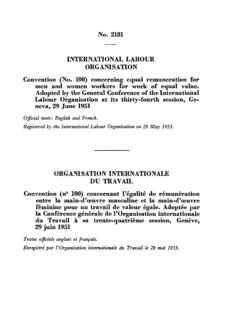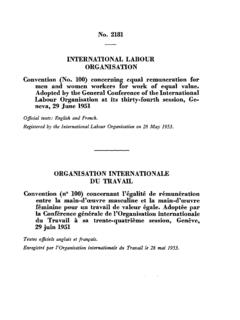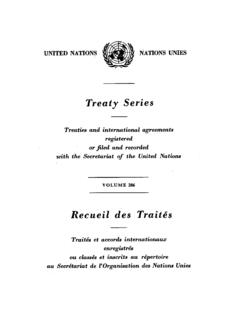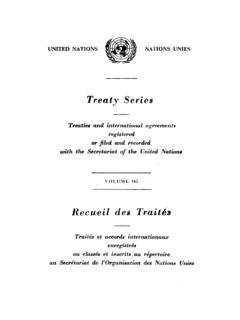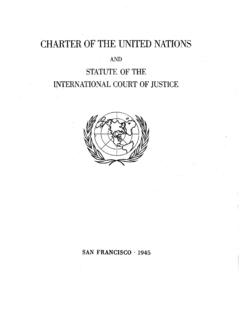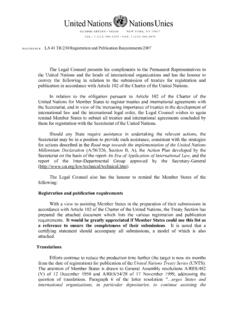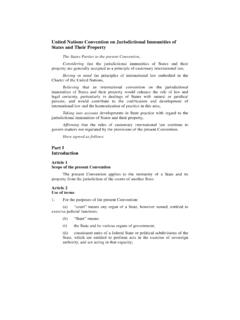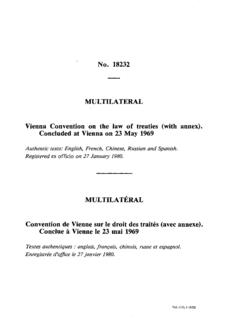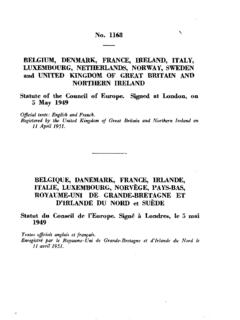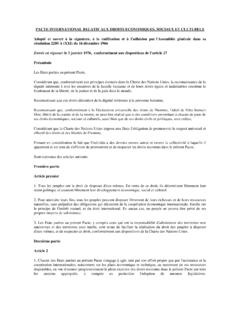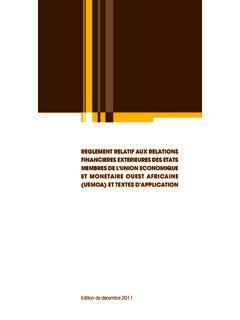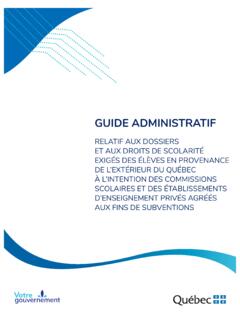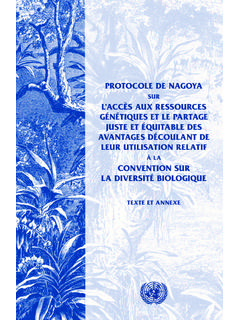Transcription of No. 14668 MULTILATERAL - United Nations
1 No. 14668 MULTILATERALI nternational Covenant on Civil and Political Rights. Adopted by the General Assembly of the United Nations on 19 December 1966 Optional Protocol to the above-mentioned Covenant. Adopted by the General Assembly of the United Nations on 19 December 1966 Authentic texts: English, French, Chinese, Russian and Spanish. Registered ex officio on 23 March international relatif aux droits civils et politiques. Adopt par l'Assembl e g n rale des Nations Unies le 19 d cembre 1966 Protocole facultatif se rapportant au Pacte susmentionn . Adopt par l'Assembl e g n rale des Nations Unies le 19 d cembre 1966 Textes authentiques : anglais, fran ais, chinois, russe et espagnol. Enregistr s d'office le 23 mars 999,1-14668172 United Nations Treaty Series Nations Unies Recueil des Trait s1976 international COVENANT1 ON CIVIL AND POLITICAL RIGHTSThe States Parties to the present Covenant,Considering that, in accordance with the principles proclaimed in the Charter of the United Nations , recognition of the inherent dignity and of the equal and inalien able rights of all members of the human family is the foundation of freedom, justice and peace in the world,1 The Covenant, with the exception of article 41,* came into force on 23 March 1976 in respect of the following States, , three months after the date of deposit with the Secretary-General of the United Nations of the thirty-fifth in strument of ratification or accession, in accordance with article 49 (1).
2 **Date of deposit of the in strument of ratification or accession (a)Date of deposit of the in strument of ratification orState accession (a.) Barbados** .. 5 January 1973oBulgaria** .. 21 September 1970(Signature affixed on 8 October 1968.)Byelorussian Soviet Socialist Republic** .. 12 November 1973(Signature affixed on 19 March1968.) Chile .. 10 February 1972(Signature affixed on 16 September1969.) Colombia .. 29 October 1969(Signature affixed on 21 December1966.) Costa Rica .. 29 November 1968(Signature affixed on 19 December1966.) Cyprus .. 2 April 1969(Signature affixed on 19 December1966.) Czechoslovakia** .. 23 December 1975(Signature affixed on 7 October1968.) Denmark**.. 6 January 1972(Signature affixed on 20 March1968.) Ecuador .. 6 March 1969(Signature affixed on 4 April 1968.) Finland*.**.. 19 August 1975(Signature affixed on 11 October1967.) German Democratic Republic**.
3 8 November 1973(Signature affixed on 27 March1973.) Germany, Federal Republic of**.. 17 December 1973(With a declaration of applicationto Berlin (West).)t(Signature affixed on 9 October1968.) Hungary** .. 17 January 1974(Signature affixed on 25 March1969.) Iran .. 24 June 1975(Signature affixed on 4 April 1968.)Vol. 999,1- 14668 State Iraq** .. 25 January(Signature affixed on 18 February 1969.) 3 October(Signature affixed on 19 December1966.) 28 May 1975(Signature affixed on 30 June 1972.) Kenya .. 1 May 1972aLebanon .. 3 November 1972oLibyan Arab Republic**.. 15 May 1970 Madagascar .. 21 June 1971(Signature affixed on 17 September1969.) 16 July 1974aMauritius .. 12 December 1973aMongolia** .. 18 November 1974(Signature affixed on 5 June 1968.) Norway*'** .. 13 September 1972(Signature affixed on 20 March1968.) Romania** .. 9 December 16 April 1975aSweden*'**.
4 6 December 1971(Signature affixed on 29 September1967.) Syrian Arab Republic** .. 21 April 1969aTunisia .. 18 March 1969(Signature affixed on 30 April1968.)Ukrainian Soviet Socialist Re public** .. 12 November 1973(Signature affixed on 20 March1968.)Union of Soviet Socialist Republics** .. 16 October 1973(Signature affixed on 18 March1968.) Uruguay .. 1 April 1970(Signature affixed on 21 February1967.) Yugoslavia .. 2 June 1971(Signature affixed on 8 August1967.)(Continui!d on page 173)1976 United Nations Treaty Series Nations Unies Recueil des Trait s 173 Recognizing that these rights derive from the inherent dignity of the human person,Recognizing that, in accordance with the Universal Declaration of Human Rights, the ideal of free human beings enjoying civil and political freedom and freedom from fear and want can only be achieved if conditions are created whereby everyone may enjoy his civil and political rights, as well as his economic, social and cultural rights,Considering the obligation of States under the Charter of the United Nations to promote universal respect for, and observance of, human rights and freedoms,Realizing that the individual, having duties to other individuals and to the com munity to which he belongs, is under a responsibility to strive for the promotion and observance of the rights recognized in the present Covenant.
5 Agree upon the following articles:PARTIA rticle 1. 1. All peoples have the right of self-determination. By virtue of that right they freely determine their political status and freely pursue their eco nomic, social and cultural All peoples may, for their own ends, freely dispose of their natural wealth and resources without prejudice to any obligations arising out of international eco nomic co-operation, based upon the principle of mutual benefit, and international law. In no case may a people be deprived of its own means of The States Parties to the present Covenant, including those having respon sibility for the administration of Non-Self-Governing and Trust Territories, shall promote the realization of the right of self-determination, and shall respect that right, in conformity with the provisions of the Charter of the United IIArticle 2. 1. Each State Party to the present Covenant undertakes to respect and to ensure to all individuals within its territory and subject to its jurisdiction the rights recognized in the present Covenant, without distinction of any kind, such as race, colour, sex, language, religion, political or other opinion, national or social origin, property, birth or other Where not already provided for by existing legislative or other measures, each State Party to the present Covenant undertakes to take the necessary steps, in accordance with its constitutional processes and with the provisions of the present(Footnote continued from page 172) See p.
6 300 of this volume for the texts of the declarations recognizing the competence of the Human Rights Committee under article 41."Several of the 35 instruments deposited were accompanied by reservations, about which the Covenant is silent. In this regard, the Secretary-General, on the basis of the consultations that he held in the same circumstances with respect to the international Covenant on Economic, Social and Cultural Rights (see No. 1-14531 of volume 993), has considered that the States concerned did not object to the entry into force of the international Covenant on Civil and Political Rights on 23 March 1976. **See p. 288 of this volume for the texts of the declarations and reservations made upon ratification or accession. fThe following countries made declarations regarding the declaration made upon ratification by the Federal Re public of Germany: France, German Democratic Republic, Ukrainian Soviet Socialist Republic, Union of Soviet Socialist Republics, United Kingdom of Great Britain and Northern Ireland and United States of America.
7 For the texts of the said declarations, see No. 1-14531 in volume 999,1-14668174 United Nations Treaty Series Nations Unies Recueil des Trait s 1976 Covenant, to adopt such legislative or other measures as may be necessary to give ef fect to the rights recognized in the present Each State Party to the present Covenant undertakes:(a) To ensure that any person whose rights or freedoms as herein recognized are violated shall have an effective remedy, notwithstanding that the violation has been committed by persons acting in an official capacity;(b) To ensure that any person claiming such a remedy shall have his right thereto determined by competent judicial, administrative or legislative authorities, or by any other competent authority provided for by the legal system of the State, and to develop the possibilities of judicial remedy;(c) To ensure that the competent authorities shall enforce such remedies when 3.
8 The States Parties to the present Covenant undertake to ensure the equal right of men and women to the enjoyment of all civil and political rights set forth in the present 4. 1. In time of public emergency which threatens the life of the na tion and the existence of which is officially proclaimed, the States Parties to the present Covenant may take measures derogating from their obligations under the present Covenant to the extent strictly required by the exigencies of the situation, provided that such measures are not inconsistent with their other obligations under international law and do not involve discrimination solely on the ground of race, col our, sex, language, religion or social No derogation from articles 6, 7, 8 (paragraphs 1 and 2), 11, 15, 16 and 18 may be made under this Any State Party to the present Covenant availing itself of the right of dero gation shall immediately inform the other States Parties to the present Covenant, through the intermediary of the Secretary-General of the United Nations , of the pro visions from which it has derogated and of the reasons by which it was actuated.
9 A further communication shall be made, through the same intermediary, on the date on which it terminates such 5. 1. Nothing in the present Covenant may be interpreted as imply ing for any State, group or person any right to engage in any activity or perform any act aimed at the destruction of any of the rights and freedoms recognized herein or at their limitation to a greater extent than is provided for in the present There shall be no restriction upon or derogation from any of the fundamen tal human rights recognized or existing in any State Party to the present Covenant pursuant to law, conventions, regulations or custom on the pretext that the present Covenant does not recognize such rights or that it recognizes them to a lesser HIArticle 6. 1. Every human being has the inherent right to life. This right shall be protected by law. No one shall be arbitrarily deprived of his In countries which have not abolished the death penalty, sentence of death may be imposed only for the most serious crimes in accordance with the law in force at the time of the commission of the crime and not contrary to the provisions of the present Covenant and to the Convention on the Prevention and Punishment of theVol.
10 999,1-146681976 United Nations Treaty Series Nations Unies Recueil des Trait s 175 Crime of This penalty can only be carried out pursuant to a final judge ment rendered by a competent When deprivation of life constitutes the crime of genocide, it is understood that nothing in this article shall authorize any State Party to the present Covenant to derogate in any way from any obligation assumed under the provisions of the Con vention on the Prevention and Punishment of the Crime of Anyone sentenced to death shall have the right to seek pardon or commuta tion of the sentence. Amnesty, pardon or commutation of the sentence of death may be granted in all Sentence of death shall not be imposed for crimes committed by persons below eighteen years of age and shall not be carried out on pregnant Nothing in this article shall be invoked to delay or to prevent the abolition of capital punishment by any State Party to the present 7.
